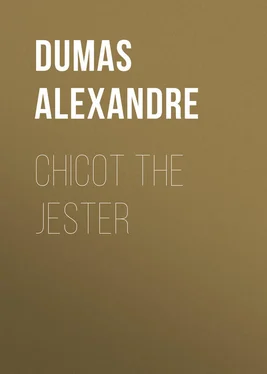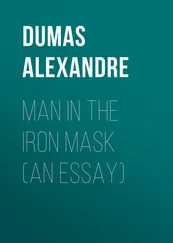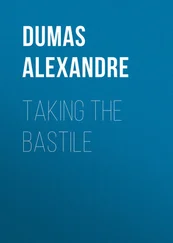Alexandre Dumas - Chicot the Jester
Здесь есть возможность читать онлайн «Alexandre Dumas - Chicot the Jester» — ознакомительный отрывок электронной книги совершенно бесплатно, а после прочтения отрывка купить полную версию. В некоторых случаях можно слушать аудио, скачать через торрент в формате fb2 и присутствует краткое содержание. Жанр: literature_19, foreign_antique, foreign_prose, на английском языке. Описание произведения, (предисловие) а так же отзывы посетителей доступны на портале библиотеки ЛибКат.
- Название:Chicot the Jester
- Автор:
- Жанр:
- Год:неизвестен
- ISBN:нет данных
- Рейтинг книги:5 / 5. Голосов: 1
-
Избранное:Добавить в избранное
- Отзывы:
-
Ваша оценка:
- 100
- 1
- 2
- 3
- 4
- 5
Chicot the Jester: краткое содержание, описание и аннотация
Предлагаем к чтению аннотацию, описание, краткое содержание или предисловие (зависит от того, что написал сам автор книги «Chicot the Jester»). Если вы не нашли необходимую информацию о книге — напишите в комментариях, мы постараемся отыскать её.
Chicot the Jester — читать онлайн ознакомительный отрывок
Ниже представлен текст книги, разбитый по страницам. Система сохранения места последней прочитанной страницы, позволяет с удобством читать онлайн бесплатно книгу «Chicot the Jester», без необходимости каждый раз заново искать на чём Вы остановились. Поставьте закладку, и сможете в любой момент перейти на страницу, на которой закончили чтение.
Интервал:
Закладка:
It was then that Quelus cried, “To arms.”
“Ah, gentlemen,” said Bussy, “it appears you wish to kill me: I am the wild boar you had to hunt. Well, gentlemen, the wild boar will rip up a few of you; I swear it to you, and I never break my word.”
“Possibly,” said Schomberg; “but it is not right, M. Bussy d’Amboise, that you should be on horseback and we on foot.” And as he spoke, the arm of the young man, covered with white satin, which glistened in the moonlight, came from under his cloak, and Bussy felt his horse give way under him. Schomberg had, with an address peculiar to himself, pierced the horse’s leg with a kind of cutlass, of which the blade was heavier than the handle and which had remained in the wound. The animal gave a shrill cry and fell on his knees. Bussy, always ready, jumped at once to the ground, sword in hand.
“Ah!” cried he, “my favorite horse, you shall pay for this.” And as Schomberg approached incautiously, Bussy gave him a blow which broke his thigh. Schomberg uttered a cry.
“Well!” said Bussy, “have I kept my word? one already. It was the wrist of Bussy, and not his horse’s leg, you should have cut.”
In an instant, while Schomberg bound up his thigh with his handkerchief, Bussy presented the point of his long sword to his four other assailants, disdaining to cry for help, but retreating gradually, not to fly, but to gain a wall, against which to support himself, and prevent his being attacked behind, making all the while constant thrusts, and feeling sometimes that soft resistance of the flesh which showed that his blows had taken effect. Once he slipped for an instant. That instant sufficed for Quelus to give him a wound in the side.
“Touched,” cried Quelus.
“Yes, in the doublet,” said Bussy, who would not even acknowledge his hurt. And rushing on Quelus, with a vigorous effort, he made his sword fly from his hand. But he could not pursue his advantage, for D’O, D’Epernon, and Maugiron attacked him, with fresh fury. Schomberg had bound his wound, and Quelus picked up his sword. Bussy made a bound backwards, and reached the wall. There he stopped, strong as Achilles, and smiling at the tempest of blows which rained around him. All at once he felt a cloud pass over his eyes. He had forgotten his wound, but these symptoms of fainting recalled it to him.
“Ah, you falter!” cried Quelus.
“Judge of it!” cried Bussy. And with the hilt of his sword he struck him on the temple. Quelus fell under the blow. Then furious – wild, he rushed forward, uttering a terrible cry. D’O and D’Epernon drew back, Maugiron was raising Quelus, when Bussy broke his sword with his foot, and wounded the right arm of D’Epernon. For a moment he was conqueror, but Quelus recovered himself, and four swords flashed again. Bussy felt himself lost. He gathered all his strength to retreat once more step by step. Already the perspiration was cold on his brow, and the ringing in his ears and the cloud over his eyes warned him that his strength was giving way. He sought for the wall with his left hand; to his astonishment, it yielded. It was a door not quite closed. Then he regained hope and strength for a last effort. For a second his blows were rapid and violent. Then he let himself glide inside the door, and pushed it to with a violent blow. It shut, and Bussy was saved. He heard the furious blows of his enemies on the door, their cries of rage, and wrathful imprecations. Then, the ground seemed to fail under his feet, and the walls to move. He made a few steps forward, and fell on the steps of a staircase. He knew no more, but seemed to descend into the silence and obscurity of the tomb.
CHAPTER III.
HOW IT IS SOMETIMES DIFFICULT TO DISTINGUISH A DREAM FROM THE REALITY
Bussy had had time, before falling, to pass his handkerchief under his shirt, and to buckle the belt of his sword over it, so as to make a kind of bandage to the open wound whence the blood flowed, but he had already lost blood enough to make him faint. However, during his fainting fit, this is what Bussy saw, or thought he saw. He found himself in a room with furniture of carved wood, with a tapestry of figures, and a painted ceiling. These figures, in all possible attitudes, holding flowers, carrying arms, seemed to him to be stepping from the walls. Between the two windows a portrait of a lady was hung. He, fixed to his bed, lay regarding all this. All at once the lady of the portrait seemed to move, and an adorable creature, clothed in a long white robe, with fair hair falling over her shoulders, and with eyes black as jet, with long lashes, and with a skin under which he seemed to see the blood circulate, advanced toward the bed. This woman was so beautiful, that Bussy made a violent effort to rise and throw himself at her feet. But he seemed to be confined in there by bonds like those which keep the dead body in the tomb, while the soul mounts to the skies. This forced him to look at the bed on which he was lying, and it seemed to him one of those magnificent beds sculptured in the reign of Francis I., to which were suspended hangings of white damask, embroidered in gold.
At the sight of this woman, the people of the wall and ceiling ceased to occupy his attention; she was all to him, and he looked to see if she had left a vacancy in the frame. But suddenly she disappeared; and an opaque body interposed itself between her and Bussy, moving slowly, and stretching its arms out as though it were playing blindman’s buff. Bussy felt in such a passion at this, that, had he been able, he would certainly have attacked this importunate vision; but as he made a vain effort, the newcomer spoke:
“Well,” said he, “have I arrived at last?”
“Yes, monsieur,” said a voice so sweet that it thrilled through Bussy, “and now you may take off your bandage.” Bussy made an effort to see if the sweet voice belonged to the lady of the portrait, but it was useless. He only saw the pleasant face of a young man, who had just, as he was told, taken off his bandage, and was looking curiously about him.
“To the devil with this man,” thought Bussy, and he tried to speak, but fruitlessly.
“Ah, I understand now,” said the young man, approaching the bed; “you are wounded, are you not, my dear sir? Well, we will try to cure you.”
“Is the wound mortal?” asked the sweet voice again, with a sad accent, which brought tears into the eyes of Bussy.
“I do not know yet, I am going to see; meanwhile, he has fainted.”
This was all Bussy heard, he seemed to feel a red-hot iron in his side, and then lost all consciousness. Afterwards, it was impossible for Bussy to fix the duration of this insensibility.
When he woke, a cold wind blew over his face, and harsh voices sounded in his ears; he opened his eyes to see if it were the people of the tapestry speaking, and hoping to see the lady again, looked round him. But there was neither tapestry nor ceiling visible, and the portrait had also disappeared. He saw at his right only a man with a white apron spotted with blood; at his left, a monk, who was raising his head; and before him, an old woman mumbling her prayers. His wondering eyes next rested on a mass of stone before him, in which he recognized the Temple, and above that, the cold white sky, slightly tinted by the rising sun. He was in the street.
“Ah, thank you, good people,” said he, “for the trouble you have taken in bringing me here. I wanted air, but you might have given it to me by opening the window, and I should have been better on my bed of white damask and gold than on the bare ground. But never mind, there is in my pocket, unless you have paid yourselves, which would have been prudent, some twenty golden crowns; take, my friends, take.”
“But, my good gentleman,” said the butcher, “we did not bring you here, but found you here as we passed.”
Читать дальшеИнтервал:
Закладка:
Похожие книги на «Chicot the Jester»
Представляем Вашему вниманию похожие книги на «Chicot the Jester» списком для выбора. Мы отобрали схожую по названию и смыслу литературу в надежде предоставить читателям больше вариантов отыскать новые, интересные, ещё непрочитанные произведения.
Обсуждение, отзывы о книге «Chicot the Jester» и просто собственные мнения читателей. Оставьте ваши комментарии, напишите, что Вы думаете о произведении, его смысле или главных героях. Укажите что конкретно понравилось, а что нет, и почему Вы так считаете.












